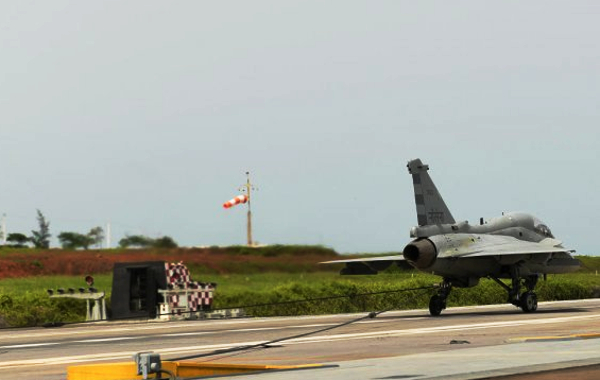The naval variant of Light Combat Aircraft (LCA) Tejas on Sunday achieved another milestone. The Prototype-2 of the indigenous fighter aircraft was tested for operation from aircraft carriers at the Shore Based Test Facility INS Hansa, Goa.
The aircraft was launched off the ski jump at 04.21 pm and then subsequently ‘trapped’ ten minutes later at 04.31 pm on the arresting gear site.
This is an important development considering the fact that it was for the first time when the complete cycle of launch and recovery necessary for aircraft carrier operations was accomplished in a single sortie.
The LCA(Navy) team had to conceptualise and experiment with complex software modes for the unique Short Take-Off but Arrested Recovery (STOBAR) concept of aircraft operations
The experiment was crucial as it had to withstand the brutal requirements of aircraft carrier operations.
The exploratory nature of this stage of the programme necessitates experimentation with multiple software options and hardware configurations. These include multiple configurations of aerodynamic surfaces, different flight control strategies, avionics tools and display symbols to ease the piloting task, multiple iterations to the “mechanicals” (dampers/structural members/contact points) etc.
Defence Minister Rajnath Singh has congratulated DRDO, ADA, HAL and Indian Navy for this major feat. Secretary, Department of Defence, R&D and Chairman DRDO Dr. G Satheesh Reddy also congratulated DRDO, ADA, HAL and Indian Navy for the achievement.
Earlier , the maiden “arrested landing” of the naval variant of the Light Combat Aircraft (LCA) Tejas on 13 September at a shore-based test facility in Goa was a “textbook landing”, DRDO sources said.
The first naval prototype (NP-1) of the Naval LCA — a twin-seater — made a “successful landing” on a 90-metre stretch after being flown by a pilot for about 40 minutes, they said.
“A normal LCA needs a runway spanning about 1-km for take-off and landing. But, for the naval variant, the take off stretch is about 200 m and landing needs 100 m. Today, the NP-1 made its maiden arrested landing, and it was a textbook landing,” a DRDO source said.
An arrested landing is one in which an aircraft on course of its landing is decelerated with the help of wires from underneath while it moves on the runway.
“The landing took place at our SBTF (shore-based test facility) at INS Hansa in Goa. The touchdown was at about 11:45 am and the landing was at a very steep angle. This will pave the way for this indigenous platform for a coordinated aircraft carrier landing in the future,” the source said.
The Defence Research and Development Organisation (DRDO) is involved in development of the naval variant of Tejas along with Aeronautical Development Agency, Aircraft Research and Design Centre of Hindustan Aeronautics Ltd and CSIR among others.
The naval version of the aircraft is in development stage. The Indian Air Force has inducted a batch of Tejas aircraft.
Initially, the IAF had placed an order with the Hindustan Aeronautics Limited (HAL) for 40 Tejas aircraft.
Last year, the IAF issued the the request for proposal (RFP) to HAL for the procurement of another batch of 83 Tejas at a cost of over ₹50,000 crore.
Source: LM
Image Courtesy: One India
You may also like
-
IAF Aircraft Set Course For Exercise Eastern Bridge VII At Oman
-
IAF Set To Host The Indian Defence Aviation Exposition-II At Jodhpur
-
Defence Secretary to co-chair 5th India-Philippines Joint Defence Cooperation Committee meeting in Manila
-
Simultaneous Launch Of ‘malpe And Mulki’, Fourth And Fifth Ships Of Asw Swc (Csl) Project
-
Aatmanirbharta in Defence: MoD signs Contract with HAL for 240 AL-31FP Aero Engines for Su-30MKI Aircraft
